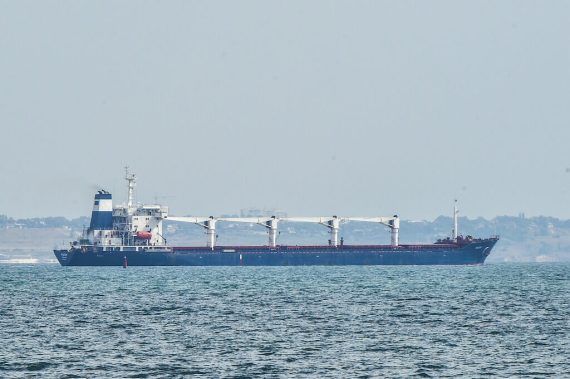The Grain Deal between Ukraine and Russia, which was facilitated by Turkey and the UN and signed on July 22 in Istanbul, has undoubtedly been one of the few diplomatic milestones throughout the war in Ukraine.
By painstakingly exerting efforts to convince both Kyiv and Moscow of the agreement, Ankara added another significant diplomatic breakthrough to its list of diplomatic achievements—in addition to gathering Russian and Ukrainian foreign ministers at the Antalya Diplomacy Forum for the first time and hosting the latest peace talks between the two sides in Istanbul.
By helping to materialize the deal, in a way, Turkey once again affirmed its unique position, which entails striking a delicate balance between Ukraine and Russia, but also between the West and Russia.
On the other hand, what made Turkey’s latest diplomatic effort different from the previous ones is its target-oriented nature: this effort was exerted specifically towards paving the way for the export of the Ukrainian grain stuck in Ukraine’s Black Sea ports.
Turkey’s previous diplomatic efforts were valuable in their own right, aiming to keep the hopes for peace or de-escalation alive or, at least, to keep the channels of communication between the parties open. Those meetings’ goal was somewhat vaguer and only achievable in the mid to long term.
Thanks to the target-orientedness of the latest episode, it is to yield the most tangible outcome so far in the diplomatic efforts concerning the ongoing war in Ukraine. Likewise, the tangible outcome of this initiative directly impacts a considerable portion of the world population as opposed to the immediate impacts of the war on a much more limited region and number of countries.
The Grain Deal is largely different from previous initiatives both in terms of the global reach of the food security aspect of the war and the universal worldwide solution it provides.
Russia Agreed Because of the Global South
The global reach of the war in Ukraine in the form of an acute food crisis is one of the main reasons of Moscow’s acquiescence to the deal, which was obviously a prerequisite for its materialization, so much so that without Russian compliance no such deal would even be possible.
Surely, Moscow agreed to the Grain Deal for its own benefits. Not only did Moscow achieve the approval to export its own food products and fertilisers in return for greenlighting the export of Ukrainian grain, but it also acquired the “moral” argument with which it will easily sell the narrative that Moscow is not the one causing the global food crisis.
On the contrary, Moscow is, as attested by the Grain Deal, “a constructive and responsible actor who is doing what’s necessary at a time of a global crisis.” Yet, it is not that Moscow cares about the international public opinion to the extent that it would change its course of action. Russia’s invasion of Ukraine has already proven otherwise.
Notwithstanding having an audience in the West hearkening to Russian claims, Moscow’s primary care is, in fact, its image and the goodwill it enjoys with mostly the “non-Western” portion of the world or the Global South, which also happens to have the highest level of dependence on Russian food products and fertilizers. Since the beginning of the war in Ukraine, Russia has fared relatively well in terms of its image and public relations, which in some cases has been transformed into either neutrality or the support of countries in the Global South for Russia.
The non-Western world has always been significant for Russian foreign policy and discourse especially under Putin, while the Global South has been dominated by the the strong emphasis on “multipolarity.” Russia’s growing isolation from the West with the war in Ukraine has made the relations of the former with the Global South even more important.
Russian Foreign Minister Sergey Lavrov’s visit to Egypt and other African countries within the scope of an “Africa tour” conveniently came right after the signing of the Grain Deal in Istanbul. Lavrov is and will be using the visits to ensure Russian partners about the uninterrupted flow of grain, and to sell the “Russian side of the story” on the war and the food crisis.
Recommended
A Russian Way of Making a Deal
Less than 24 hours after the signing of the Grain Deal, Russian missiles hit Ukraine’s Odessa port, the main port from which the grain will be exported. Expectedly, this raised questions on the deal’s viability.
First of all, although outrageous, the attack was not unexpected behavior. Moscow has a track record of emphasizing the asymmetry between itself and its lesser partners in any deal, usually by hurting the other side through military power. By using provocative crude force against the ones with whom Moscow strikes a deal, it aims to send the message that the deal is not between equal powers and that Moscow is not the one who desperately needs the deal, but the other way around.
Moscow demonstrates and even “teaches” the other side its superiority and usually its indispensability for any given deal. As long as the other side caves in—and they usually do—the deals with Russia function by fits and starts, often tested by Moscow’s intermittent harassments and violations.
The Russian attack on the Odessa port was yet another reminder to all, either parties to the deal or its spectators, that those who strike a deal with Russia should not be mistaken by an “illusion” of parity with the latter. Moscow is keen to maintain its upper hand and initiative to decide on the fate of deals, and this will also likely be the case for the Grain Deal.
Maintaining the Grain Deal will be very challenging for Kyiv, Ankara, and the UN. Although Moscow is not likely to scrap the deal or put its core in jeopardy at this moment, the deal will be subject to interruptions as a result of any move by the West or Kyiv that would be deemed by Moscow as hostile.





